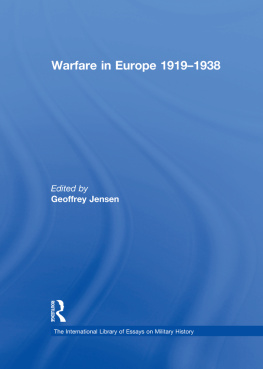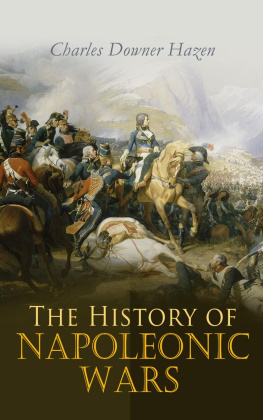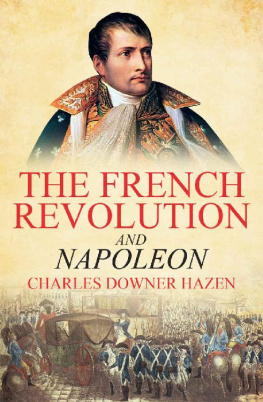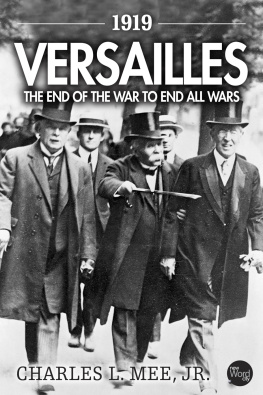THE YEAR 1870 WILL LONG remain memorable in the annals of Europe. For in that year occurred a great and decisive war whose outcome was destined to exercise a large and profound influence upon the history of the subsequent period; whose consequences were to prove pervasive, far-reaching and unhappy, just as the four terrible years through which the world has recently passed will inevitably determine the future of the world for many decades to come. There was a certain tragic unity to that intervening period between the Franco-Prussian War and the World War, the shadow of the former, the dread of the latter hovering over the minds of men, full of menace, inspiring a recurrent sense of uneasiness and alarm. All the various streams of activity, all the different movements, national and international, social and economic, intellectual and spiritual, all the complex and diverse phenomena of the life of Europe during that crowded half-century took their form and color largely from the memory of war, the fear of war, the preparation for war. A period like that is surely worth studying. Indeed only if men acquire or possess a just understanding of it, only if they retain a vivid sense of its lessons and its warnings, will they be able to avert a repetition of its horrors, only thus will they have the aid of either chart or compass on their voyage into the future.
But apart from this general feeling of insecurity and apprehension, inspired by the Franco-Prussian War, that war had several immediate and specific consequences which must inevitably render the year 1870 notable in the history of modern times and which furnish a proper starting-point for this narrative. The war of 1870 completed the unification of Germany and created the German Empire. It completed, also, the unification of Italy, by giving to the kingdom, as its capital, the incomparable city of Rome. It overthrew the Second Empire in France and produced the Third Republic. It robbed France of Alsace-Lorraine for the benefit of Germany and thus embedded militarism in the life of Europe.
Of course, adequately to understand events of such moment we would be obliged to review the period before 1870, for the founding of the German Empire, of the Italian Kingdom, and of the French Republic was not something hastily improvised in that year as a result of the war. Each of these achievements had a long history behind it; each was the product of a long process of evolution. The year 1870 was only a year of culmination and fruition, the end of one period, the beginning of another.
From such a review as would satisfactorily explain the rise of modern Italy and Germany, their achievement of nationality after centuries of disunion, we are precluded here. Yet a slight sketch of the history of this remarkable transformation may be of value and, indeed, is necessary if we would have the background essential for the proper appreciation of the later period.
ITALY
A century ago Italy was not a body politic; it was only a geographical expression. There was no Italian nation, but there existed within the peninsula ten small and entirely separate states, among which the most important were the Kingdom of Piedmont or Sardinia, the Grand-Duchy of Tuscany, the Papal States, the Kingdom of Naples and the two rich provinces in the north, Lombardy and Venetia, which belonged to Austria. There was no form of political union among these states, not even that of a loose confederation, as in the case of Germany. Consequently, there was no Italian flag, no Italian reigning house, no Italian citizenship, no Italian army. Out of this jumble of petty, independent states arose, in the great decade between 1859 and 1870, the present unified Kingdom of Italy.
All through the nineteenth century there were those who felt that these millions of Italians ought to be united into a single nation, that only thus could they occupy a position in the world worthy of their past, and one that would ensure a happier future. The most thrilling and persuasive spokesman of this national aspiration was Joseph Mazzini, who lived from 1805 to 1872. Even as a boy Mazzini was impressed with the unhappiness and misery of his country, subdivided, as it was, into numerous jealous and warring states. In the midst of the noisy, tumultuous life of the students around me I was, he says in his autobiography, somber and absorbed and appeared like one suddenly grown old. I childishly determined to dress always in black, fancying myself in mourning for my country. At the age of twenty-five Mazzini was thrown into prison because of his liberalism. After his release from prison, he founded a society called Young Italy which was destined to be an important factor in making the new Italy. Its object was to create, by persuasion and by action, a single country, common to all. Only those under forty were to be admitted to membership, because Mazzinis appeal was particularly to the young. Place youth at the head of the insurgent multitude, he said; you know not the secret of the power hidden in these youthful hearts, nor the magic influence exercised on the masses by the voice of youth. You will find among the young a host of apostles of the new religion. With Mazzini the liberation and unification of Italy was indeed a new religion, appealing to the loftiest emotions, entailing complete self-sacrifice, complete absorption in the ideal, and the young were to be its apostles. Theirs was to be a missionary life. He told them to travel, to bear from land to land, from village to village, the torch of liberty, to expound its advantages to the people, to establish and consecrate the cult. Let them not quail before the horrors of torture and imprisonment that might await them in the holy cause. Ideas grow quickly when watered with the blood of martyrs. Never did a cause have a more dauntless leader, a man of purity of life, a man of imagination, of poetry, of audacity, gifted, moreover, with a marvelous command of persuasive language and with burning enthusiasm in his heart. The response was overwhelming. By 1833 the society reckoned 60,000 members. Branches were founded everywhere. Garibaldi, whose name men were later to conjure with, joined it on the shores of the Black Sea. This is the romantic proselyting movement of the nineteenth century, all the more remarkable from the fact that its members were unknown men, bringing to their work no advantage of wealth or social position. But, as their leader wrote later, All great national movements begin with the unknown men of the people, without influence except for the faith and will that counts not time or difficulties.
Mazzini believed that the first thing to do in bringing about the unification of Italy was to drive Austria out of the country. Austrians were foreigners; yet they held the two richest provinces in the peninsula, Lombardy and Venetia, and so great were their resources and their power that they dominated, more or less directly, the other states. Only if they were expelled could the Italians unite and control their own destinies. They could be driven out only by war, and Mazzini believed that the Italians were numerous enough and brave enough to carry through, alone and unaided, this necessary work of liberation. After the war should succeed, Mazzini hoped and urged that Italy should be proclaimed a republic, one and indivisible. Mazzini worked at a great disadvantage, as he was early expelled from his own country and was compelled to spend nearly all his lifetime as an exile in London, hampered by paltry resources, and cut off from that intimate association with his own people which is so essential to effective leadership.











